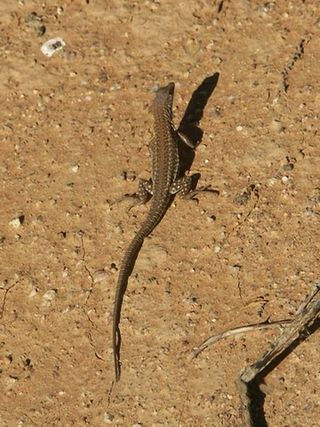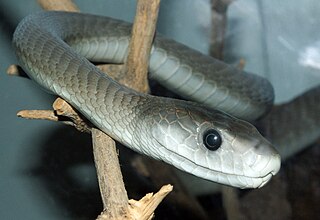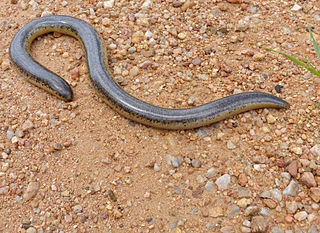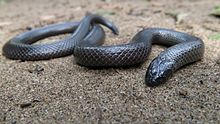Sepsina is a genus of skinks. The genus is endemic to southern Africa.

Meroles is a genus of lizards, commonly known as desert lizards, in the family Lacertidae. The genus contains eight species, inhabiting southwestern Africa, especially the Namib Desert.

Albert Karl Ludwig Gotthilf Günther, also Albert Charles Lewis Gotthilf Günther, was a German-born British zoologist, ichthyologist, and herpetologist. Günther is ranked the second-most productive reptile taxonomist with more than 340 reptile species described.

The black mamba is a species of highly venomous snake belonging to the family Elapidae. It is native to parts of sub-Saharan Africa. First formally described by Albert Günther in 1864, it is the second-longest venomous snake after the king cobra; mature specimens generally exceed 2 m and commonly grow to 3 m (9.8 ft). Specimens of 4.3 to 4.5 m have been reported. Its skin colour varies from grey to dark brown. Juvenile black mambas tend to be paler than adults and darken with age. Despite the common name, the skin of a black mamba is not black; the color name describes rather the inside of its mouth, which it displays when feeling threatened.

Python anchietae is a python species endemic to southern Africa. According to Donald George Broadley (1990), this species is most closely related to the ball python of western Africa, and no subspecies are currently recognized. It is named after the Portuguese naturalist and explorer José Alberto de Oliveira Anchieta. Like all other pythons, it is not venomous.

Amblyodipsas concolor, also known as the KwaZulu-Natal purple-glossed snake or Natal purple-glossed snake, is a species of mildly venomous rear-fanged snake in the Atractaspididae family.
Amblyodipsas dimidiata, or the Mpwapwa purple-glossed snake, is a species of mildly venomous rear-fanged snake in the Atractaspididae family.

Xenocalamus mechowii, or the elongate quill-snouted snake, is a species of mildly venomous rear-fanged snake in the subfamily Aparallactinae of the family Atractaspididae. The species is endemic to Africa.
Amblyodipsas katangensis, or the Katanga purple-glossed snake, is a species of rear-fanged mildly venomous snake in the family Lamprophiidae. The species is endemic to Africa.

Amblyodipsas microphthalma, also known as the eastern purple-glossed snake or white-lipped snake, is a species of mildly venomous rear-fanged snake in the Atractaspididae family.

Afrotyphlops schlegelii, commonly known as Schlegel's beaked blind snake or Schlegel's giant blind snake, is a species of snake in the family Typhlopidae. The species is endemic to eastern and southern Africa, and bears the distinction of being the world's largest typhlopid. It is harmless to humans and lives exclusively on a diet of termites.

Anchieta's cobra, sometimes referred to as the Angolan cobra, is a species of venomous snake in the family Elapidae. The species is native to Southern Africa.

Afrotyphlops is a genus of snakes in the family Typhlopidae.
Monopeltis is a genus of amphisbaenians in the family Amphisbaenidae. Species in the genus are commonly known as worm lizards, even though they are not lizards. The genus is endemic to southern Africa. 19 species are placed in this genus.

Monopeltis anchietae, also known commonly as Anchieta's worm lizard, Anchieta's spade-snouted worm lizard, and the Angolan spade-snouted worm lizard, is a species of amphisbaenian in the family Amphisbaenidae. The species is native to southern Africa.
Monopeltis luandae is a species of amphisbaenian in the family Amphisbaenidae. The species is endemic to Angola.











